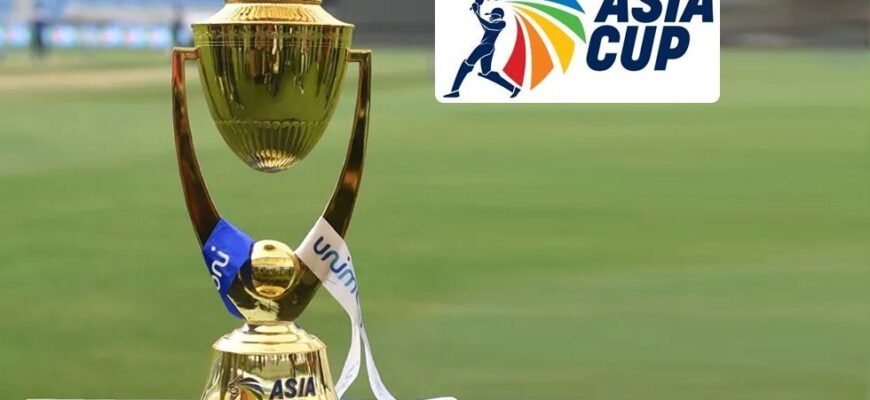In the grand theater of cricket, where triumphs are celebrated with pomp and tradition, a recent event at the Asia Cup 2025 final has left many scratching their heads. The victorious Indian team, after a hard-fought battle against rivals Pakistan, found themselves in an unusual predicament: a trophy presentation without the trophy, or rather, without the official presenting hand. This incident has swiftly escalated from a sporting moment to a geopolitical kerfuffle, highlighting the intricate, and often volatile, relationship between cricketing nations.
The Unconventional Presentation
The scene was set for a classic post-match ceremony. India, led by Suryakumar Yadav (as reported, a rare captaincy for him in a major continental final), had just clinched the Asia Cup 2025 title, besting Pakistan in a thrilling encounter. The crowd awaited the customary sight of the winning captain hoisting the coveted trophy, presented by the dignitaries of the Asian Cricket Council (ACC) and the host board. However, what transpired was far from conventional.
Reports indicate that the Indian squad chose not to accept the trophy from Mohsin Naqvi, the chief of both the Pakistan Cricket Board (PCB) and, pertinently, the ACC. Following this unexpected refusal, Naqvi reportedly exited the ceremony with the trophy in tow, leaving the Indian team to celebrate their victory without the physical emblem of their achievement. This act, or rather, the lack thereof, immediately fueled speculation and criticism, particularly from the Board of Control for Cricket in India (BCCI), which has reportedly called for Naqvi`s impeachment from his ACC role.
Yousuf`s Fiery Intervention: Rules vs. Realpolitik
Amidst the swirling controversy, former Pakistan batting maestro Mohammad Yousuf entered the fray, offering a robust defense of Naqvi`s actions and a scathing critique of India`s stance. Appearing on Samaa TV, Yousuf, no stranger to controversial statements himself – recall his infamous `pig` comment regarding Suryakumar Yadav – minced no words.
“What Chairman Sir (Mohsin Naqvi) is doing is absolutely right. He has taken the correct stand. India should have taken the trophy at that moment. According to ACC and ICC rules, he was standing there as ACC chief, and the trophy should have been handed through his hands only,” Yousuf asserted, emphasizing the sanctity of established protocol.
Yousuf went further, accusing India of being “stuck in their `filmy world`,” suggesting a theatrical approach to sportsmanship rather than adherence to rules. “You were busy making your films. I said it that day too—they are not coming out of the filmy world. This is sports, this is cricket; movies won`t be playing here,” he declared, adding a layer of ironic meta-commentary to the unfolding drama. His implication is clear: while cinema allows for retakes and dramatic liberties, the genuine sport demands respect for its frameworks, even when political currents run strong.
Beyond the Boundary Ropes: A Diplomatic Delivery
The refusal to accept the trophy isn`t merely a lapse in etiquette; it`s a symbolic protest, a public declaration of discontent rooted in the administrative corridors of cricket. The BCCI`s reported demand for Naqvi`s impeachment as ACC chief points to a deeper rift, likely concerning governance, scheduling, or perhaps the distribution of power and resources within Asian cricket. Such gestures on the field often reflect profound disagreements off it, turning sporting contests into arenas for subtle, or not-so-subtle, political maneuvering.
This incident serves as a stark reminder that international cricket, particularly between arch-rivals India and Pakistan, transcends the 22 yards. It`s a complex tapestry woven with threads of national pride, administrative power plays, and a history fraught with tension. When protocols are deliberately sidestepped, even in the moment of victory, it sends a clear message about strained relationships and a refusal to acknowledge legitimacy.
The Future of Asia`s Cricketing Harmony
As the dust settles on the Asia Cup 2025 final, the trophy`s fleeting absence from the winners` hands will likely cast a long shadow. This episode raises critical questions about the spirit of the game, the role of sportsmanship, and the ability of cricket bodies to navigate geopolitical sensitivities. Is adherence to protocol paramount, or does the spirit of sporting respect take precedence? And when does a disagreement become so profound that it impacts the very act of celebrating victory?
The cricketing world will be watching closely to see how these administrative tensions evolve. For now, the image of a champion team celebrating without their prize, and a former legend lamenting their `filmy` theatrics, will undoubtedly serve as a curious footnote in the annals of Asia Cup history. Perhaps, someday, the trophy will find its way to its rightful place without further drama, but until then, the `gentleman`s game` seems to be playing out an increasingly intricate, and rather ungentlemanly, script.







